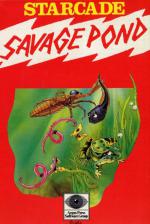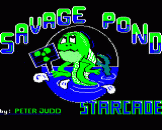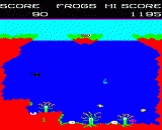Introduction
"Awesome in its conception...Brilliant in its depiciton...Dynamic in its execution... The world you are about to enter bears no resemblance to any arena you have ever encountered before. Weapons are of no avail in this small habitat.
The only source of protection at your disposal are quick wits and fast reflexes. The only reward is to survive against monsters of unbelievable ferocity and cunning, and to avoid hazards more perilous and deadly than any you might find on a trip through the outer universe. This is the real world, populated by the creatures of our own inner universe, where Nature is red in tooth and claw. Brace yourself now, and come with Starcade into the still water and deceptive calm of a Savage Pond."
You are now in the watery environment of the pond. At the top of the screen is a line allocated to SCORE, FROGS and HIGH SCORE.
Score and high-score are self-explanatory. The aim of the game is to build up a strong and healthy colony of frogs. (How else can we continue to play frog games? After all, they have to breed somewhere!) More about frogs later, but pay particular attention to a small log on the island in the top centre of the screen.
The rest of the scene depicts a pond. The water is full of fat and delicious amoeba (dare we say strawberry-flavoured?) pulsating merrily away as they wait their turn to be digested.
Rather more sinsiter are the hydra, weaving their deadly tentacles as they lie in wait for the unwary. One sting from their harpoon cells means a deep purple, and permanent dream for the unfortunate victims.
Occasionally a juicy worm falls into the water. There are a useful supplement to the tadpole's diet, and add substantially to the score. For a very limited time, the extra strength absorbed will give immunity to the stings of the hydra, and allow you to go into places where you would be very smartly dealt with. (But don't push your luck!) Every five worms that you eat prepares the way for another tremulous step along the path of evolution. For convienience, the number of worms currently eaten is shown in the bottom left hand corner of the screen. Every time the total reaches five, a beetle larva appears. If you can capture and eat him before worm-count is cleared, then you are one step nearer to reaching your goal. If he is not eaten, he will remain there and increase your opportunities for promotion at higher levels.
There are nine steps to be taken before you begin the serious occupation of frog breeding, but rather than interfere with the action, the program is only interrupted three times. Three phases are used to allow adjustments to screen data, but will also give the player an indication of his achievements to date.
At the bottom of the pond are three eggs of frogspawn. Even as you look, one egg has begun to develop. When the egg has fully opened, our tiny protagonist is ready to face the perils of his brave new world. He will not venture forth until he is sure that there is some sentinent being ready to control and protect him, so take a deep breath and push that joystick firmly forward. Once he is out and about, this small and very vulnerable creature is in your hands, and will go where you command. The speed at which he swims is controlled by the fire button.
Now you can swim around and test the water. Fill your little tummy with goodies, and try to capture those worms. If you don't eat, you will eventually starve to death so tuck into delicious amoeba. This level is positively idyllic. Flitting above the pond are multi-coloured dragonflies, dropping eggs in all manner of places. Do your best to eat the eggs as they are good for you. Should you fail to catch them in flight, try to eat a worm and dive into those forbidden places to devour them before they hatch. If that plot fails, watch out for the larvae as they emerge and dash frantically for safety. In your own interests, see that they don't make it; or they will shortly return as voracious dragonfly nymphs.
The nymph's staple diet is tadpoles, and he will pursue his quest for food relentlessly until his appetite is satisfied. Your only chance is to avoid those crushing jaws until his energy is exhausted, and he feels the urge to go and hide himself away to chrysalise and become yet another dragonfly.
As you master each phase, further hazards will be automatically introduced until you reach the stage where you can begin the serious business of frog breeding. As in the natural order of things in Mother Nature's plan, there are some things you can eat, and other things trying to eat you. Here are some of the pond nasties you will meet along the way.
Fresh water jelly fish drop in for a bite. Beware of them as they bob up and down near the surface of the water. Their stings are as deadly as the hydra. Mother Nature's deadliest enemy, the greatest despoiler of the countryside, will bring along his dumper truck and off-load a drum of radio-active waste into the hitherto innocent water's edge. No doubt some of our many critics will declare that this sort of activity is strictly controlled, and that we have departed from the reality of our saga. This sort of thing couldn't really happen. Could it?
In our next stage to liven things up a bit, we have a change of scenery. By way of encouragement, we also introduce our very first frog, sitting proudly on top of his little brown log.
Now the game becomes multi-action. As the dragonfly flits overhead, Mr. Frog can fill his face by capturing it with his long, sticky tongue.
This is activated by pressing the space bar, and if timed properly, will give pause for that infernal egg laying.
If, having got this far, you are unfortunate enough to have all your eggs and tadpoles destroyed, then we have made special arrangements with a computer mating agency. Your little frog will have a visitor and, in a loving embrace, they will produce a specimen of spawn, and depart for pastures new, after a knowing wink from our amphibian friend. The spawn will come to rest at the bottom of the pond, before hatching to give you another chance towards development of that colony.
Down below, the tadpole is continuing his pursuit of ruining his digestive tracts. His problems are increasing by the minute. The radio-active waste is becoming quite a problem.
Creeping into our web of fantasy, comes the water spider. Spiders are cowardly creatures, renowned for their stealth, patience and cunning rather than their courage. This spider will not harm you unless you are foolish enough to become enmeshed in his web; one more tadpole will be conveyed to his parlour.
With so much slaughter about, it is inevitable that the water will in time become dirty and stagnant. This creates an ideal environment for the water flea. These are natural refuse engineers, and they will sample anything left lying about. If you have nothing better to do, it might be a good idea to swallow them up before they go to work on an egg. Having survived all of these hazards, the frog colony is ready to grow. Unfortunately, the radiation has now affected terrestrial creatures in the vicinity of the pond. The mutant bumble-bee hovering over your frog's head is pretty angry. The days of idly sitting by living off dragonflies are definitely over. Now you must defend yourself by using that tongue to kill the bee before it gets you; he and his buzziness associates are like apiarian space invaders, they are out to get you.
Your target is to breed as many frogs as you can without being killed off by the bees or the natural hazards of the pond. It's up to you to maintain the balance. Remember : without tadpoles, you cannot breed frogs. Without frogs you cannot have tadpoles. Good Luck!
Cast List
Starcade proudly presents the members of the cast of this program in order of their appearance:
AMOEBA (Rhizopoda). A single cell animal which moves and eats through temporary extrusions of the elastic surface of the epidermis (outer skin). This creature lives in water and reproduces by sub-division, as do all other members of the protozoa family. These include Difflugia, Arcella, Spirostomum, Ambiguum, Stentor Polymorphous and others.
HYDRA (Chlorohydra Viridissima). Hydra appear in a variety of forms, but generally these little animals bear a strong resemblance to a minature tree. They normally anchor their foot in the mud and catch their prey with harpoon cells triggered by their tentacles. Hydra reproduce through buds (polyps), which eventually break off to become separate entities.
BLOODWORM (Phylum Platyheminthes). A very small reddish-yellow worm which lives in damp conditions. This creature has one tooth set above the mouth. Of the family Turbellaria.
DRAGONFLY (Erythromma Najus). A beautiful but short-lived specimen which lays its eggs in water, notwithstanding that other members of the Odonata family may prefer to anchor their eggs to plantlife in or around the water. The eggs and newly hatched larvae are extremely susceptible to predators, but once the larva has developed, it becomes a ferocious monster with powerful biting jaws. The front legs are hinged to project past the head to seize the prey.
JELLYFISH (Craspedacusta Sowerbeii). A free swimmer which is similar in appearance to the more familar saltwater variety, but which is in fact a close relative of the hydra. They are both members of the group Coelenterata, and their method of catching and eating food is practically identical.
BEETLE LARVA (Marcroplea Leachi). The tiny beetle larva lives totally under water until maturity, when the adult beetle leaves for dry ground.
SPIDER (Argyronata Aquitca). The only true water spider. It weaves its web underwater, and then traps an air bubble and sits back to await dinner.
WATER-FLEAS (Scapholeberis Mucronata). Tiny creatures which live on detritus and organisms, commonly found in most ponds. They are of the family Cladocera.
BUMBLE-BEE (Bombas Lapidarius). Our bee has none of the characteristics of the rest of the family owing to an over-reaction to radiation.
THE COMMON FROG (Rana Temporaria). There are many, many varieties of frogs and their close relatives, toads. Their basic diet is of insects which are caught by the frog sitting perfectly still until food comes within range, then capturing it on the end of a long, sticky tongue.
The frog breeds by the female laying eggs, which are fertilised by the male. The resultant spawn develops into a tadpole which lives and breathes underwater, feeding on small organisms and plants. The process of change known as metamorphosis takes place gradually over a period of between three to six months, after which they become young, air breathing frogs, and take to the land.
Game Controls
Z - Left, X - Right, * - Up, ? - Down














